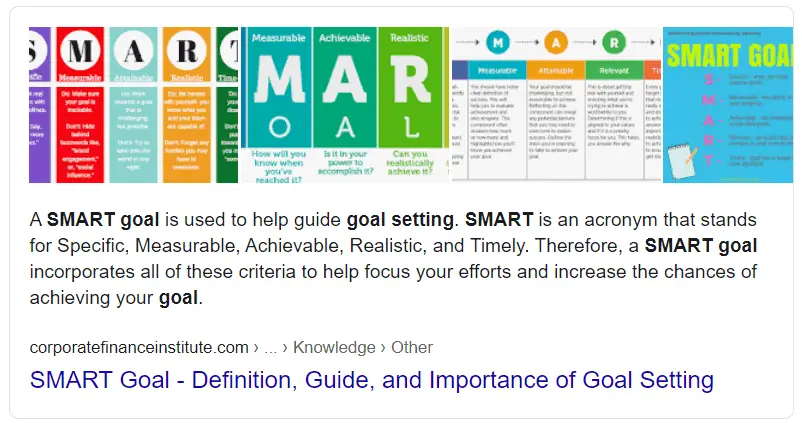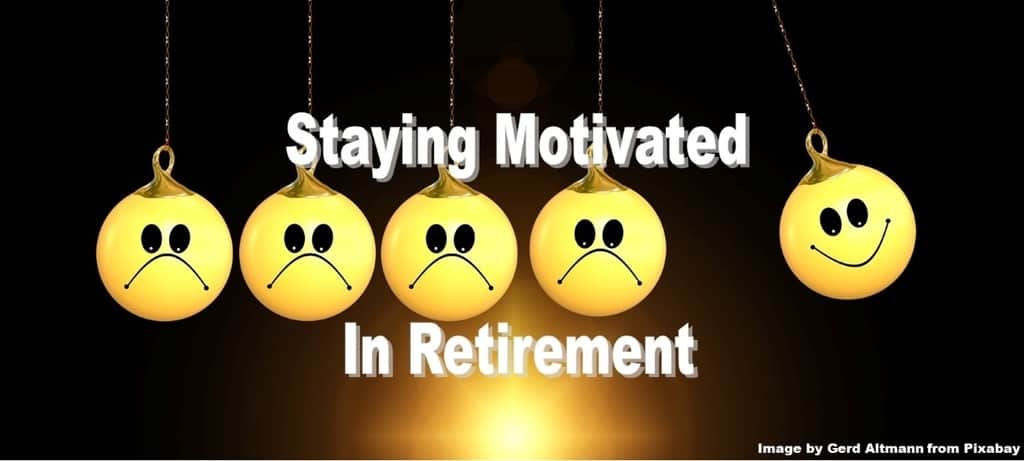Staying motivated in retirement can be quite a challenge, especially during these uncertain times. We all assumed retired life would be good, then WHAMO, fire and brimstone rained down a global pandemic upon us!
Who would have guessed we would get hit with a once in a hundred-year crisis? There are things we can influence while others are totally out of our control.
So, how do we go about squeezing every bit of life and excitement we can out of our golden years?
7 Tips on Staying Motivated in Retirement:
- 1Understand what motivates you.
- 2Find your passion.
- 3Set achievable goals.
- 4Celebrate success.
- 5Don’t do it alone.
- 6Remain flexible and adaptable.
- 7Stay positive.
Retired and Unmotivated
What did you look forward to most? No more alarm clocks or rushing off to work are common responses. After a lifetime of work, this is a well-deserved period when we can slow down and enjoy life.
The only problem is the novelty wears off and we start getting bored. The pandemic only heightens this issue as most activities are now untenable.
Cabin fever sets in as folks are stuck at home with little or nothing to do. Even visiting family and friends is like taking your life into your hands.
After a while, every day can start to feel the same. Motivation dries up and there’s not much to look forward to.
Tips on Staying Motivated in Retirement
Everyone is unique with a variety of things that motivate them.
If you weren’t crazy about your job, you were likely externally driven. In exchange for showing up each day and doing your job, you received a paycheck. After retiring, that is gone. Now, you need to find reasons for getting up and keeping active.
Many retirees choose to work part-time or volunteer. Not only does this provide structure in their lives, it also helps fill their days. When they’re doing something they enjoy, this becomes internally motivating.
In other words, they do it because they want to, not because they have to. Thus, staying motivated in retirement involves doing interesting and worthwhile things.
Tip # 1: Understand What Motivates You
First and foremost, what is your “Why”. Consider your nature and what you gravitate toward. Are you:
Understanding yourself makes it easier to figure out what sorts of activities you’ll most enjoy.
For instance, a “people person” will find shared activities far more appealing than an individual pursuit. Likewise, a “task-oriented” individual would be more interested in immersing themselves into their latest project.
Tip # 2: Find Your Passion
Very few people have found an all-consuming passion. Most of us get interested in something for a while, then their interest fades, moving onto something else. After a while, they might feel at a loss as to what they feel like doing.
The one thing we all know is what we don’t feel like doing. The problem is sometimes we get stuck and nothing appeals to us.
If you’re in this position, it can be helpful to ask your spouse or a friend. They probably have insights and thoughts you haven’t considered.
Another option, think back to something you enjoyed when you were younger. An interest never fully explored that fell by the wayside. Or, remember those aptitude tests we took back in high school?
My wife had a knack for drawing and her test results suggested becoming a cartoonist or artist. Something she never pursued. After all these years, one of the aspects of our site she most enjoys is the graphic design.
Further to this, our interests change and evolve. By keeping an open mind, there’s lots of things you may not have considered or had time for. For example, if you like travelling to other countries, wouldn’t it be nice to speak the language?
Tip # 3: Set Achievable Goals
I know, I know, who wants to make goals? My first thought is it sounds like work and takes all the fun out.
From a different perspective, setting goals provides focus helping you stick to a plan. Especially when you’re lackadaisical and feeling uninspired.

I’m not necessarily suggesting you go through the entire SMART goal plan if you’re trying out a new interest. However, you may want to consider some simple goals.
For instance, let’s say you wanted to learn how to play the guitar. You’d be setting yourself up for failure expecting to be singing around the campfire within the first month.
Realistically, learning to play “Happy Birthday” might be a significant accomplishment. After six months, you might have learned a repertoire of a dozen or more songs.
Tip # 4: Celebrate Success
Ever notice how we are our own worst critics?
Instead of celebrating successes, we tend to beat ourselves up. Somehow, we’ve determined we’re either not worthy or should have accomplished more.
Negative self-talk can be the greatest killer of motivation. Especially when you’re tackling something new, this is the time to be gentle with yourself. Celebrate even the small victories and reward your progress.
Tip # 5: Don't Do It Alone
We tend to be more enthusiastic with the support and encouragement of others. You might get stuck on something seemingly simple.
Almost for certain, someone else has faced the same challenge. A helpful word can make a world of difference. Likewise, it won’t be long until you can help others.
Another advantage of a group setting is the atmosphere of something greater than ourselves. Even online, you’ll develop new friendships and be inspired by others.
Tip # 6: Remain Flexible and Adaptable
Life is full of setbacks and disappointments. Always has been and always will be. Too often we give up when things don’t go as planned. Rather, it’s worth evaluating what went wrong.
If you still enjoy the activity, is there anything you need to do differently? You may find your interest is waning and decide to move on to something else.
Tip # 7: Stay Positive
Someone with a positive attitude believes, most of the time, everything will turn out okay. Instead of dwelling on the negative, they focus on what is good. This has a direct correlation on our motivation and openness to try new things.
While it’s good to know what’s happening around us, most of it is beyond our control. All the doom and gloom begins to wear us down and how we perceive the world.
This can create anxiety, heighten fear leaving us feeling powerless. Maybe it’s not such a bad thing to limit our intake of daily news and social media.
Closing Thoughts
Maintaining motivation in your retired years might be one of the greatest challenges. There’re so many ways to lose focus and find ourselves on the slippery slope. The further we slide, the more difficult it becomes to extract ourselves.
Related article: The Ultimate Guide of Things to do When Retired and Bored

